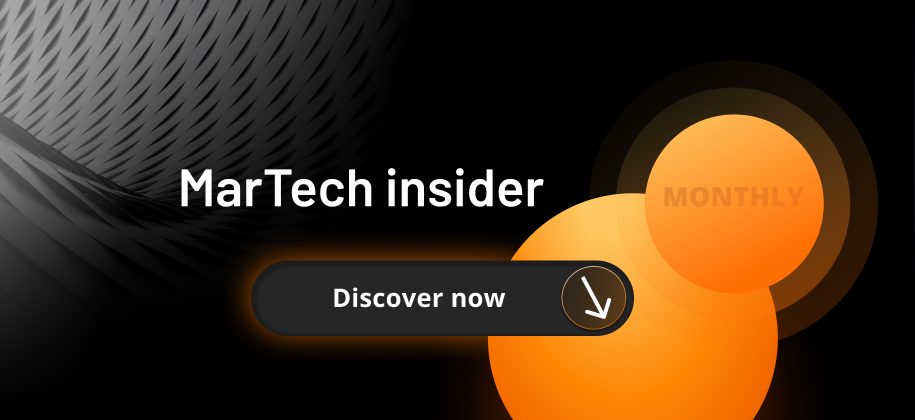AdTech and MarTech are riding the change train at full speed, and there’s no way to stop it. But we believe the ride is more enjoyable if you enjoy the view and keep track of the most memorable moments of the industry’s journey.
To take a step back and reflect on pivotal moments and emerging trends, the Xenoss team created a monthly digest covering the month’s news, opinions from Xenoss experts and thought leaders, new features AdTech vendors have shipped to market, and more.
Today’s roundup is the collection of February’s top stories and discussions. We will be covering:
🔸 Featured story: IAB Tech Lab calls Google out for lack of progress on Privacy Sandbox
🔸 Notable reads: Walmart acquires VIZIO, Microsoft’s deal with Mistral AI spikes pushback from regulators, Amazon is building a post-cookie solution
🔸 Xenoss’ opinion: What does Meta replacing its account team with AI tell us about the future of the Internet?
🔸 Feature of the month: Klaviyo releases Klaviyo AI
🔸 Discussions of the month: podcasts and trending social media conversations
🔸 Stat of the month: the impact of a multi-million fraud scheme
Subscribe to our newsletter to keep track of AdTech and MarTech updates month-to-month and never miss meaningful conversations.

IAB Tech Lab’s assessment lit a fire under Google’s Privacy Sandbox.
The IAB Tech Lab threw a real curveball into the ad world with its latest report calling out Google’s Chrome Privacy Sandbox. IAB’s analysis focuses on the Protective Audiences API and checks if it supports standard programmatic use cases (spoiler alert: it doesn’t).

Why IAB is not a fan of Google’s Privacy Sandbox?
In September of last year, IAB Tech Lab formed a Privacy Sandbox Taskforce, where representatives from 65 AdTech companies and publishers weighed in on the state of the Sandbox. The task force members analyzed 44 use cases across five categories.
Here are their key concerns (for a full recap, see IAB Tech Lab’s report).
- Exclusion advertising is no longer supported
- Advertisers have limited control over bidding against themselves (under the Sandbox, Google creates bids for all eligible interest groups)
- Built-in ad exchange and ad server both put existing solutions at risk and give Google a monopoly in the segment
- There’s been no Media Rating Council certification that would prove that Google Privacy Sandbox counts impressions correctly
- Using VAST tags for serving video ads is possible but not practically feasible
What’s next? After seeing IAB Tech Lab’s report, Google fired back, accusing the report of “fundamental errors, inaccuracies, and instances of incomplete information.”
According to the company, the root issue was that Google was not on the panel—a decision IAB Tech Lab made to create room for “candid conversations” between experts.
Yet, Google representatives feel like the IAB’s actions showed a lack of cooperation so a new review panel might be forming–this time, with the search giant on board.
As for Privacy Sandbox, Google remains unwavering in its commitment to use it as a cookie replacement. As a matter of fact, the search giant might have more important things to deal with (like ChatGPT breathing down its neck and threatening to revolutionize search).
To understand why 2024 is a difficult time for Google, check out this excellent AdExchanger write-up by Shiv Gupta, founder of U of Digital. The author explains how the search giant got stuck between the rock (antitrust regulators) and a hard place (AI).
“It’s been more than a decade since Google was in a real search war. But between the rise of TikTok, the growth of retail search (Amazon, Walmart, Target, etc.) and the AI revolution, a new search war is already underway. And Google is losing ground.” –Shiv Gupta, Founder at U of Digital (Source: AdExchanger).

Amazon hits at post-cookie tech project ID++ (AdAge)
Advertising in the post-cookie era will inevitably be a paradigm shift for AdTech, and Amazon wants a shot at winning the market. According to internal sources, the company is building a range of tools (collectively known as ID++) to improve addressability. Right now, it’s mostly hearsay (the word got out only when Amazon posted a job description mentioning the program), but ID++ could bring Amazon one step closer to being the champion of AdTech.

Microsoft’s deal with Mistral AI faced EU scrutiny (Reuters)
Microsoft’s deal with OpenAI has already put the company ahead of Big Tech in its AI footprint. Yet, a new deal with Mistral AI, a leading open-source LLM, means the company might seek more control over the ecosystem. The plan is promising, but antitrust authorities think it will go against competition rules. Regulators are concerned that the deal will lead to a higher concentration of power in the hands of a few.

It was an important deal financially (the retailer paid over $2.3 billion in cash for the ownership of the TV-making company) and strategically. The move proves that Walmart is betting on its retail media business, Walmart Connect, which brought in 22% of the company’s total Q4 revenue. A more robust TV toolset also sets Walmart up to win against its primary competitor– Amazon.



Meta’s layoffs continue to impact advertisers as the company replaces account team members with AI
Source: Digiday February 26, 2024
Until recently, most claims of AI coming after AdTech jobs felt premature. Even though LLMs are a lot smarter than anything we’ve seen before, they still struggle with original thoughts and understanding precisely what you want.
However, Meta decided to put the thought experiment of AI job replacement into practice by downsizing its account team. Understandably, the company’s big clients are unhappy with the change–for their budgets, they surely deserve human attention. Getting used to AI-only assistants will take time, but the critical question is, “Will AI be as efficient as humans? Better yet, can it outperform us?”
I believe all the hype around generative AI replacing humans comes from misunderstanding how these models work. LLMs rely mostly on pattern recognition to determine which word is the likeliest to follow the previous one. The human mind operates at a significantly higher complexity level, assessing parameters like a person’s emotional state or the ethical implications of an action in a split second.
The building blocks that would enable true creativity in LLMs are not yet on the market.
At the same time, automation coupled with human expertise will make a difference. This is the route Meta is taking—there are still humans on the account team, but AI processes the bulk of the work. I believe this model can be sustainable in the long run, and I expect more companies to jump on the downsizing bandwagon in years to come.

In February, Digiday reported that CycloneBot, a fraud CTV scheme discovered by DoubleVerify and Roku and still active, might be siphoning $7.5 million/month from advertisers. The scheme mimicked users’ CTV viewing sessions. Read the full story on Digiday

Klaviyo, a marketing automation platform for email and SMS marketing, released Klaviyo AI, an “intelligent” marketing toolset.

What’s new:
The new system has multiple features for streamlining workflows, among which:
- Segments AI: generate segments based on audience prompts
- Email AI: tool that streamlines writing emails and automating campaigns
- SMS AI: creates ai-generated SMS replies and tracks insight from campaigns
- Forms AI: artificial intelligence helps A/B test forms and optimize them for conversion
- AI roadmap: leverages predictive analytics to anticipate market trends and customer expectations
Why is it important? The new feature allows marketers to spend less time drafting emails and forms.
What about the tech? Klaviyo AI uses a proprietary model trained on customer and product data.

Summarized in a phrase, February was a “cookie replacement rant.” Everyone was discussing cookie alternatives, privacy challenges, and the losses the market will take in 2025.
However, if you want to dive deeper into other moments that spiked discussions on social media, here’s our round-up:
Podcast of the month: Ride on Demand: the Uber Way to Ad Success | AdTech Heroes
Whenever AdTech Heroes releases a podcast, it’s definitely worth listening to. But, even in their selection of guests and topics, the episode with Paul Wright, Head of Advertising, UK at Uber, stands out. In the podcast, Paul shares how Uber built its advertising ecosystem and used data to set it up for success. Listen to the full episode.

Trending topic of the month: Meta released its earning reports for Q4, 2023
Advertising and marketing professionals were discussing Meta’s last-quarter earning reports for 2023. Here are our selected insights from the community:






Meme of the month
This Seinfeld-based meme perfectly summarizes the challenge streaming services face when setting up advertising models.


Poll of the month: generative AI could use more accuracy and credibility
Adtech God asked his community to decide what’s missing from AI-generated content: for most, accuracy and credibility were the problem.


This was Xenoss’s February AdTech and MarTech news round-up. Subscribe to our monthly newsletter on LinkedIn to get a full view of the industry – from breaking news and expert opinions to memes and community discussions.



